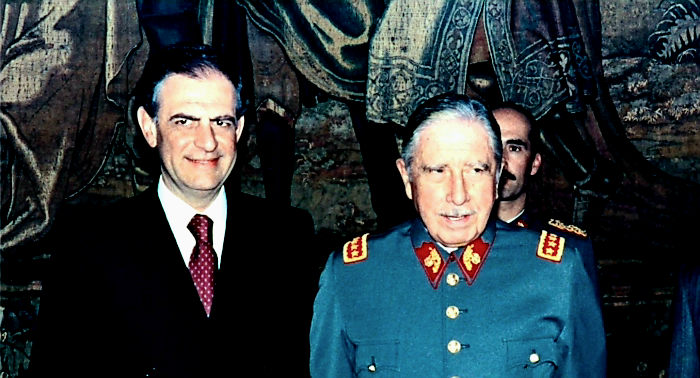The newspaper El Mercurio, the main mouthpiece of the right-wing and big business in Chile, dedicated two separate pages to the death of Sergio Fernández, considered the most prominent civilian in the service of Augusto Pinochet’s dictatorship. First as his Minister of Labor, then as Comptroller General of the Republic, and finally as his Minister of the Interior and Head of the Cabinet. History must therefore recognize him as one of the most abject collaborators of the civil-military regime that ruled de facto for seventeen years and systematically violated human rights in this country.
Fernández was accused of being the author and accomplice of such despicable episodes as the Condor and Villa Grimaldi operations, for which the Minister of Justice, Juan Guzmán Tapia, requested his removal from office, which was denied by the Court of Appeals in Santiago, at a time when the influence of Pinochetism still held sway over the judiciary.
It is well known that Fernández’s signature made possible the Amnesty Law, which meant impunity for numerous crimes committed by the dictatorship until the courts belatedly agreed to put an end to an arbitrary act that was an affront to international law. Just as there are hundreds of decrees signed by him, using which thousands of political prisoners were imprisoned in concentration camps and subjected to torture, as the prestigious lawyer Roberto Garretón testified at the time. To this must be added other testimonies that even accuse him of being an observer of these abnormal procedures.
It was precisely because of his obsession that the dictator appointed him senator-designate, a period during which he tried to clean up his image and even claim credit as one of the promoters of the restoration of democracy. His book “My Struggle for Democracy” is undoubtedly a blatant attempt to seek impunity until his death last week at the age of 85. An editorial effort to distance himself from the dictator and to be recognized by civilians who, like him, had the pretense of being republican politicians. People like Jaime Guzmán Errázuriz, Sebastián Piñera himself, Andrés Chadwick, Sergio de Castro, and others have also flouted the law and even managed to reach very high public office in our strange and shameful post-dictatorship.
It is undeniable that the skill and opportunism of civilians like Sergio Fernández explain the impunity of these and other active and passive accomplices of the dictatorship. In his ability to charm, of course, the new authorities of the Concertación, the New Majority, and parts of the left itself, who have abandoned their promises of justice “for reasons of the state”, repulsive pragmatism and apathy. To the extent that today many of them are those who blame the victims of repression for the violence that is currently shaking the country. They are trying, as they did in 1973, to encourage military action and justify the police violence to confront the workers themselves who come to La Moneda to put forward their demands. And also, against the population, which has been raised by the hundreds of thousands of homeless all over the country. At the same time, the political class as a whole begins its parliamentary lobbying to save the fraudulent PPPs and Isapres from bankruptcy, implicating itself in episodes of corruption as deplorable, if not more so, than those of the military and civilian governments that preceded them in power.
They refuse to pay the cost of impunity, which, in all sorts of inappropriate actions, causes new disturbances in the peace of the nation and affects the public’s credibility in democracy itself. Moreover, they have the shamelessness to pay tribute to a man like Sergio Fernández, who should have been sentenced to life imprisonment for his grave responsibility in all that has happened. This is a lawyer who supported the military coup of 1973 from the very beginning and who has never shown any remorse or willingness to make amends. He refused to cooperate in the search for truth, justice, and reparation.










